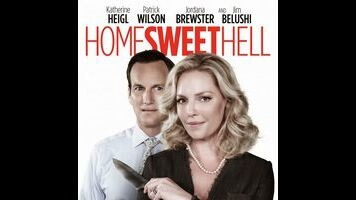Committing to moldy clichés from the get-go, the movie quickly establishes Mona as the wife from hell when Don attempts to initiate sex, only to be firmly reminded that their next session of intercourse is scheduled from 8:30 p.m. to 8:45 p.m. on the 9th. (It’s doubtfully fertility related—they have two kids and don’t seem to be seeking a third.) Sexual frustration makes Don especially susceptible to the advances of his furniture store’s hot new employee, the symbolically named Dusty (Jordana Brewster), who comes on to Don so hard that only a paragon of ineffectual masculinity embodied by Wilson could possibly fail to recognize that he’s being conned. Sure enough, Dusty soon announces that she’s pregnant and threatens to tell Mona unless Don coughs up $25,000. When he instead confesses, Mona decrees that Dusty has to go, not realizing that she was in league with some heavily tattooed thugs (A.J. Buckley and Kevin McKidd). More carnage-by-housewife ensues, involving kitchen knives, a samurai sword, and a corpse-dismembering table saw.
Directed by Anthony Burns (Skateland) and written by three guys with no notable credits among them (though one supplied “additional material” to something called Death Scenes 2), Home Sweet Hell never bothers to explain why a gang of criminals would target the owner of what appears to be a moderately successful furniture store. Nor does it make it credible that Don would agree to commit murder for the sole purpose of saving his marriage, given that he’s married to a person with zero redeeming qualities. It’s far too busy trotting out unfunny racist and homophobic jokes, which are ostensibly designed to underline what an awful person Mona is, but just come across as opportunistic hatefulness. The movie despises everybody, really—even the two pre-teen kids are constructed as miniature versions of their parents, with the daughter smug and bossy and the son weak and clueless. (Screams heard underneath the closing credits strongly imply, in concert with earlier dialogue, that the kids are being raped. Hilarious.)
Given Heigl’s infamous comments about the sexist nature of Knocked Up, she must have somehow persuaded herself that Mona Champagne functions as a sly, knowing parody of horrific American attitudes about women. She was dead wrong, but her ecstatically goofy performance during the violent scenes is the only thing that makes this disaster slightly bearable.

 Keep scrolling for more great stories.
Keep scrolling for more great stories.
